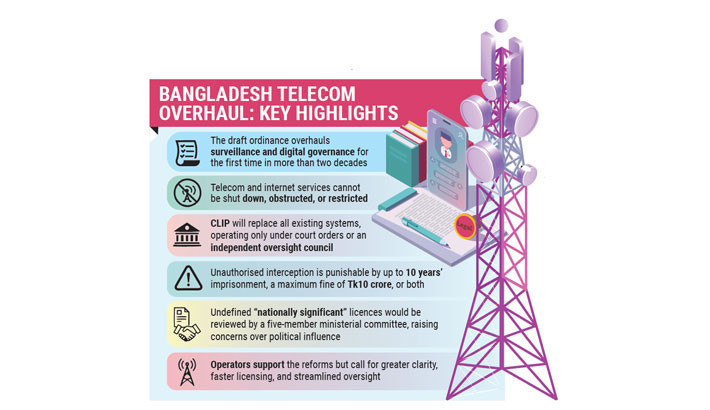Telecom overhaul: Reform promises, but big questions remain
Suman Saha, Dhaka
Published: 15 Nov 2025

The draft Bangladesh Telecommunication (Amendment) Ordinance, 2025 proposes the most sweeping overhaul of surveillance rules, telecom governance, and digital regulation in more than two decades.
While it proposes long-awaited safeguards to curb unauthorised monitoring and protect communication data, experts caution that several provisions could significantly expand state control over the digital ecosystem.
The draft, prepared by the Ministry of Posts and Telecommunications, was published online for public feedback, which closed on November 15.
Stronger surveillance safeguards
A central feature of the draft is a strict ban on unauthorised surveillance and a guarantee that telecom and internet services “shall under no circumstances be shut down, obstructed, or restricted.”
It proposes establishing a Central Lawful Interception Platform (CLIP) under the Home Ministry, replacing all existing systems – including the controversial National Telecommunication Monitoring Centre (NTMC). CLIP would operate only on court orders or directives from an independent oversight council.
The draft covers all forms of communication, including voice calls, messaging, internet traffic, call detail records, IP data, and location information.
It prohibits interception for political, personal, or social purposes, with violations punishable by up to 10 years in prison, a fine of Tk10 crore, or both.
A semi-judicial oversight council, comprising nominees from major constitutional offices and retired judges, would evaluate interception requests based on “necessity, proportionality, legality, and accountability.”
Intercepted data must be encrypted, stored for five to eight years, and reflected in an annual national interception report.
Concerns over oversight, licensing, and a ‘super-ministry’
Despite these safeguards, analysts warn that the ordinance could centralise sweeping powers under the Posts and Telecommunications Division (PTD), which would assume oversight of nearly all digital activities – from social media and OTT platforms to AI, IoT, FinTech, and emerging technologies.
“This expansion effectively turns PTD into a super-ministry without the specialised capacity to oversee such a vast digital landscape,” said Abu Nazam M Tanveer Hossain, a public policy advocate.
He noted that overlapping mandates could create bureaucratic conflicts and compliance uncertainty.
Regulatory independence is another key concern. Although the Bangladesh Telecommunication Regulatory Commission (BTRC) is positioned as an independent regulator, the draft requires “nationally significant” licences – a term left undefined – to be reviewed by a five-member ministerial committee.
Experts fear this could weaken BTRC’s authority and open space for political influence over licensing, mergers, and market approvals.
The broad definition of “telecom services” may also require apps, platforms, IoT pilots, or even foreign digital services accessible in Bangladesh to obtain licences, potentially stifling startups, research, and innovation, Hossain added.
Industry response
Mobile operators and infrastructure providers welcomed the ban on shutdowns and the unified interception mechanism under CLIP.
Grameenphone’s Chief Corporate Affairs Officer Tanveer Mohammad said the draft addresses longstanding industry demands but added,
“There remains substantial room for improvement to ensure alignment with other applicable laws and regulations. We are hopeful that the consultation will lead to a positive outcome and that the draft will be appropriately refined based on stakeholders’ inputs.”
At a recent consultation hosted by the PTD, industry leaders also praised faster licensing timelines, mandatory public hearings, arbitration mechanisms, and streamlined regulatory processes. They urged the government to better coordinate oversight across ministries to reduce duplication and improve investment certainty.
A crucial reform, but clarity needed
Criminalising unlawful surveillance and abolishing ad hoc interception systems represent an important step toward restoring public trust.
However, the draft still contains significant ambiguities regarding regulatory authority, licensing thresholds, and the balance of power between the ministry and the regulator.
At the consultation, Faiz Ahmad Taiyeb, special assistant to the Chief Adviser on Posts, Telecommunications and Information Technology, said all feedback would be reviewed and incorporated into the revised draft.
“The opinions shared by stakeholders reflect the real challenges and needs of the sector,” he said. “The government’s goal is to establish a balanced and modern telecommunications law that harmonises investment, innovation, accountability, and citizen protection.”
The reporter can be reached at: [email protected]
Edited by: Anayet Rahaman

